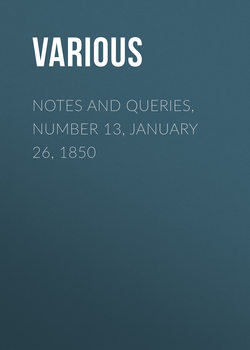Читать книгу Notes and Queries, Number 13, January 26, 1850 - Various - Страница 2
NOTES
MARLOWE AND THE OLD "TAMING OF A SHREW."
ОглавлениеHaving only just observed an announcement of a new edition of the works of Marlowe, I take the earliest opportunity of calling the attention of the editor to a circumstance which it is important that he should know, and the knowledge of which,—should it have escaped his notice, as it has that of all other writers on the subject,—I trust may not be too late for his present purpose. Without farther preface, I will introduce the subject, by asking Mr. Dyce to compare two passages which I shall shortly point out; and, having done so, I think he will agree with me in the opinion that the internal evidence, relating to our old dramatic literature, cannot have been very much studied, while such a discovery as he will then make still remained to be made. The first passage is from the so-called old "Taming of a Shrew" (six old plays, 1779, p. 161.), and runs as follows:—
"Now that the gloomy shadow of the night,
Longing to view Orion's drisling looks,
Leaps from th'Antarctic world unto the sky,
And dims the welkin with her pitchy breath;"
the second is from Doctor Faustus (Marlowe's Works, vol. ii. p. 127.), which, however, I shall save myself the trouble of transcribing; as, with the exception of "look" for "looks," in the second line, and "his" for "her," in the fourth, the two passages will be found identical. Being, some years ago, engaged, in connection with the first of these plays, in the pursuit of a very different object,—in which I cannot say that I altogether failed, and the result of which I may take an opportunity of communicating,—I made a note of the above; and at the same time followed it up by a general examination of the style of Marlowe. And, to make a long matter short, I may say that in this examination, besides meeting with a dozen instances of the identity of the writer of passages in the Taming of a Shrew and of passages in Marlowe's two plays, Doctor Faustus and Tamburlaine, I found such general resemblance in style as left no doubt upon my mind that, if one of these plays be his acknowledged work, as indisputable will be his claim to the other two. I was not aware at that time of the evidence, in Henslow's Diary, of Marlowe's authorship of Tamburlaine; but, so far from considering it inferior, I was inclined to place it, in some important respects, at the very head of his plays.
I will not take up your space now with the parallel passages which I noted; but, should you wish it, and be able to make room for them, I will furnish you with a list. It is, of course, obvious that the one I have quoted proves nothing by itself; accumulated instances, in connection with the general question of style, alone become important. I will conclude, by giving a list which I have made out of Marlowe's plays, in favour of which I conceive there to be either internal or external evidence:—
"Locrine.
Tamburlaine the Great (two parts).
Jew of Malta.
Doctor Faustus.
Edward the Second.
Massacre of Paris.
Taming of a Shrew.
Dido, Queen of Carthage (with Nash)."
SAMUEL HICKSON
St. John's Wood, Jan. 12. 1850
[We trust our correspondent will favour us with the further communications he proposes on this very interesting point.]
